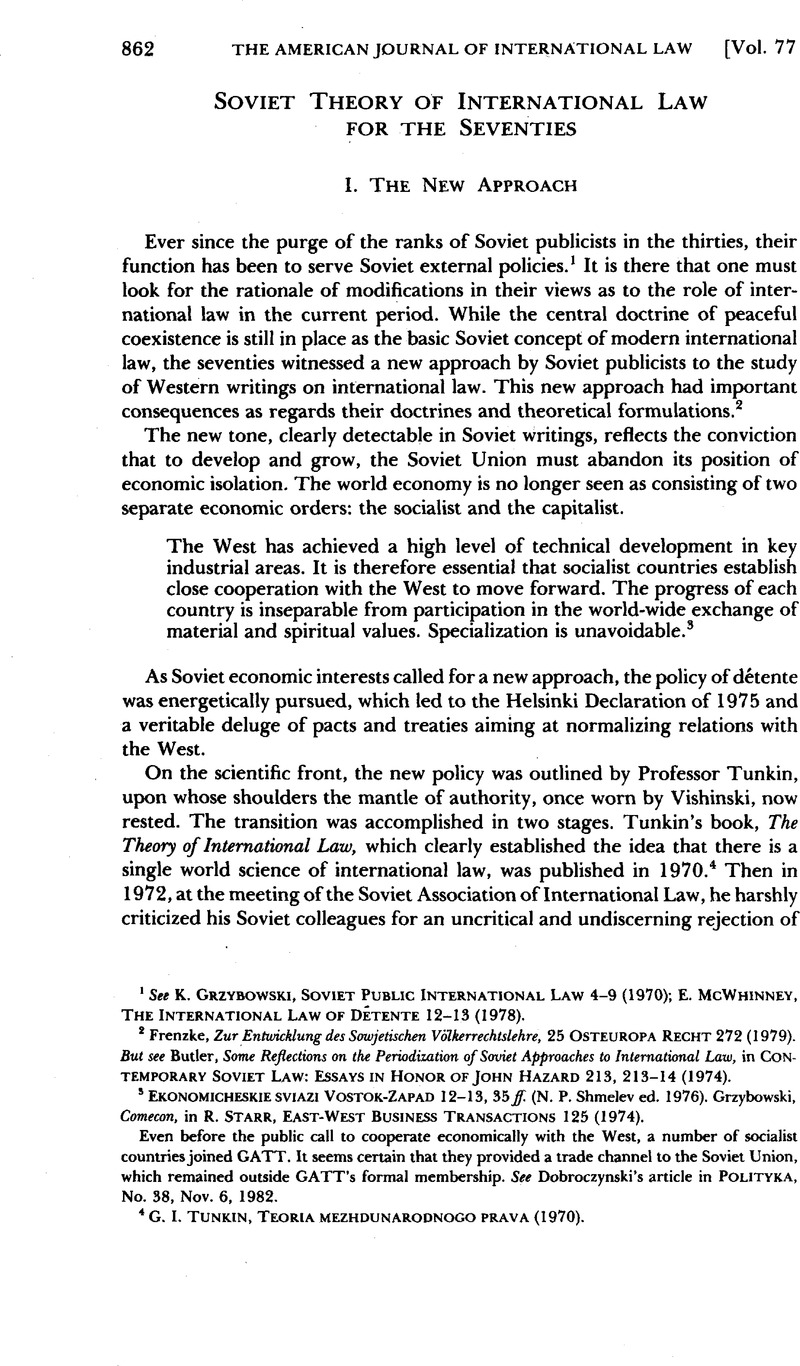Published online by Cambridge University Press: 27 February 2017

1 See Grzybowski, K., Soviet Public International Law 4–9 (1970)Google Scholar; McWhinney, E., The International Law of Détente 12–13 (1978)Google Scholar.
2 Frenzke, , Zur Entwicklung des Sowjetischen Völkerrechtslehre, 25 Osteuropa Recht 272 (1979)Google Scholar. But see Butler, , Some Reflections on the Periodization of Soviet Approaches to International Law, in Contemporary Soviet Law: Essays in Honor of John Hazard 213, 213–14 (1974)Google Scholar.
3 Ekonomicheskie Sviaz1 Vostok-Zapad 12–13, 35 ff. ( Shmelev, N. P. ed. 1976)Google Scholar. Grzybowski, , Comecon, in R. Starr, East-West Business Transactions 125 (1974)Google Scholar.
Even before the public call to cooperate economically with the West, a number of socialist countries joined GATT. It seems certain that they provided a trade channel to the Soviet Union, which remained outside GATT’s formal membership. See Dobroczynski’s article in Polityka, No. 38, Nov. 6, 1982.
4 Tunkin, G. I., Teoria Mezhdunarodnogo Prava (1970)Google Scholar.
5 K. Grzybowski, supra note 1, at 10ff., on Vishinski’s role in the 1938 conference of Soviet legal scholars.
6 Tunkin, , Zadatchi, nauki mezhdunarodnogo prava v svete reshenii XXIV sjezda KPSS, Sovetskoe Gosudarstvo i Pravo, No. 7, 1972, at 34.Google Scholar
7 G. I. Tunkin, supra note 4, at 156, 232; Baskin, J. J. & Feldman, D. I., Mezhdunarodnoe Pravo Problemy Metodologii 19 ff. (1971)Google Scholar; Levin, D. B., Aktualnye, Problemy Teorii Mezhdunarodnogo Prava (1974)Google Scholar.
8 D. B. Levin, supra note 7, at 114, 127 ff.
9 Id. at 78–94.
10 J. J. Baskin & D. I. Feldman, supra note 7, at 47 ff, 62.
11 Id. at 51–53.
12 Feldman, , 0 sisteme mezhdunarodnogo prava, 1977 Sovetskil Yezhegodnik Mezhdunarodnogo Prava 91–116 Google Scholar.
13 Talalayav, , Programmirovannye uchebniki i uchebnyi process, naprimere uchebniha mezhdunarodnogo prava, Vestnik Moskovskogo Universiteta (Seria Pravo, Jan. 1981)Google Scholar. The first textbook departing from the traditional organization of Soviet manuals was Ignatenko, G. V. & Ostapenko, D. D., Mezhdunarodnoe Pravo (1978)Google Scholar. Cf. Frenzke, supra note 2, at 290–91.
14 Lenin, , 33 Sochineniia 123 (5th ed. 1956)Google Scholar.
15 Pravda, Feb. 15, 1956.
16 Starushenko, G. B., Mirovoi Revolutsionnyj Protsess i Sovremennoe Mezhdunarodnoe Pravo 22, 247, 285 (1978)Google Scholar.
17 Id. at 183–89.
18 Id. at 248.
19 Marksistko-Leninskaia Teoria Gosudarstva I Prava, Osnovnye Inst1tuti I Poniatia 230 (1970).
20 D. B. Levin, supra note 7, at 104, 114–27.
21 G. I. Tunkin, supra note 4, at 104–14.
22 Id. at 38–39.
23 D. B. Levin, supra note 7, at 127.
24 G. B. Starushenko, supra note 16, at 100–01, 249 ff. Ignatienko, G. V., Mezhdunarodnoe Pravo I Obshchestvennyj Protsess 110–12 (1972)Google Scholar.
25 G. B. Starushenko, supra note 16, at 13–14, 289–304.
26 Id. at 94, 200.
27 Id. at 27 ff.
28 Id. at 75, 132, 174–78.
29 Kravchenko, V. V., Obshchestvennye Organisatii SSSR Na Mezhdunarodnoi Arene (1969)Google Scholar.
30 Tunkin, G. I. , Osnovy Sovremennogo Mezhdunarodnogo Prava 158 (1956)Google Scholar; cf. also G. I. Tunkin, supra note 4, at 237, 431 ff.; D. B. Levin, supra note 7, at 2, 15, 25–26; K. Grzybowski, supra note 1, at 20–21.
31 G. I. Tunkin, supra note 4, at 236–37, 309; G. V. Ignatienko, supra note 24, at 8 ff; D. B. Levin, supra note 7, at 25–26.
32 G. I. Tunkin, supra note 4, at 21 ff., 45 ff, 156 ff. and passim.
33 G. V. Ignatienko, supra note 24, at 122–23.
34 Id. at 129–30.
35 All Soviet writers of the epoch accept the consensual theory of general international law. However, only Tunkin developed the theory of consensus in full. See G. I. Tunkin, supra note 4, at 49, 270; Minasian, I. M., Pravovye Osnovy Leninskoi Diplomatii 61–148 (1970)Google Scholar; Ushakov, N. A., Sovetskoe Gosudarstvo I Provgressyvnoe Razvitie Mezhdunarodnogo Prava (1977)Google Scholar; G. B. Starushenko, supra note 16, pt. I, at 46–54. See USSR Const, art. 28 (1977).
36 D. B. Levin, supra note 7, at 112 ff., 167–68, 177; G. B. Starushenko, supra note 16, at 143; G. I. Tunkin, supra note 4, at 431, 440.
37 G. I. Tunkin, supra note 4, at 431–40. According to Article 30 of the 1977 USSR Constitution, the USSR—as a component part of the world socialist system, of the socialist alliance—strengthens the friendship and cooperation, and comradely mutual aid with the socialist countries on the basis of the principle of socialist internationalism, and actively participates in economic integration and socialist division of labor.
38 G. B. Starushenko, supra note 16, at 232.
39 Charles, Martens, in the preface to his Causes célèbres du droit des gens (1827)Google Scholar, acknowledged that at the time of the supremacy of the Holy Alliance, the right of armed intervention was one of the principles of international law. At the time of his writing, it had already been applied twice, against Piedmont and the Kingdom of Naples. The basis of that right was the Treaty of Paris of Nov. 20, 1815.
40 D. B. Levin, supra note 7, at 205–06; J. J. Baskin & D. I. Feldman, supra note 7, at 24–31.
41 D. B. Levin, supra note 7, at 209.
42 Ibid.
43 See ibid.; G. I. Tunkin, supra note 4, at 233.
44 D. B. Levin, supra note 7, at 209.
45 J. J. Baskin & D. I. Feldman, supra note 7, at 52–60; G. I. Tunkin, supra note 4, at 297–302; D. B. Levin, supra note 7, at 22.
46 See Pechota, , The Contemporary Marxist Theory of International Law, 75 ASIL Proc. 149 (1981)Google Scholar.